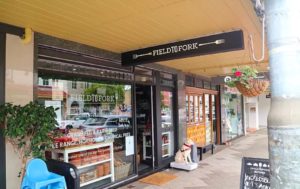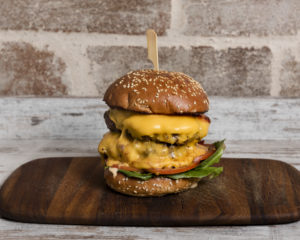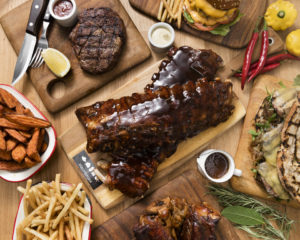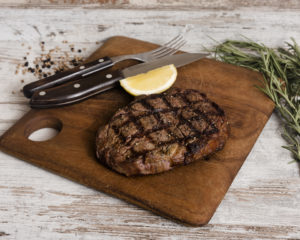Three generations of preserving tradition coupled with excellence in food
Field To Fork is a family-owned and operated food business started by Paula Horwitz in 2014. Together with her husband Gary, they shared over 50 years of collective experience in the food industry. They were not going to open a conventional butcher shop.
The Swiss Deli
Paula and Gary arrived from their native South Africa in 1986 and have innovated in the Australian food industry ever since. In 1987, they bought Swiss Deli on Glebe Point Road. They worked together behind the counter 7 days a week, using their spare time to brush up knowledge on the imported cheeses, cured meats and condiments the deli already sold to their established clientele. Gary, being a trained chef, started experimenting with his culinary skills in lunch service to the working locale. Swiss Deli began to serve unique gourmet sandwiches made-to-order, chargrilled chicken with Gary’s homemade peri-peri sauce and fresh, warm salads with dressings made every morning. In the late 80s, no suburban deli in Sydney had these offers. Setting the tone for what was to come, Swiss Deli was not a conventional deli. 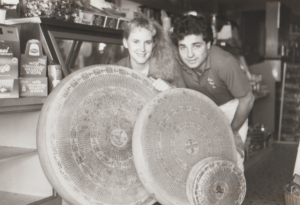

Gary and Paula raised their children in the 1990s. Gas-sealed supermarket bought plastic trays of homogenous pink beef mince was the norm for spag bowl in almost every household. Gary, having worked in Michelin 2 Star restaurants in London, realized something was wrong. Meat shouldn’t be watery, grey and tasteless. They began to notice a few problems with the Australian meat industry. If you use supermarket gas-packs, I implore you to visit an independent butcher and realize the difference for yourself. Once you’ve cooked with mince that has been prepared by a butcher, knowledgeable and skilled in the craft, using meat that has been raised by caring famers, you will never go back. Not only does it taste better, ours is raised with no hormones, growth promoters or antibiotics, either. It’s better for you and it’s better for your family.
The Monday Morning Cooking Club
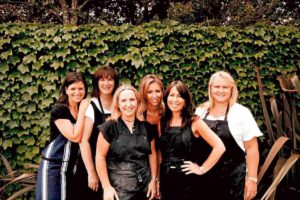

Field To Fork
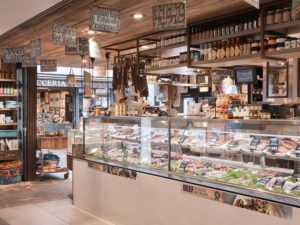

Firstly, lack of transparency. Buying meat shouldn’t be about buying a gas-filled plastic pack. It’s about the animals. It’s about the farmers. It’s about the journey it’s made to your fork. We realized customers had no idea what they were buying, where it came from and whether it was actually free-range or if it was just labeled as such. We decided that if we were going to open a butchery, we wanted our customers to know exactly where their meat was coming from, and exactly what kind of life the animal lived before it made it to the plate. Our beef and lamb is grass-fed and farm raised in Swan Hill, Victoria. Our pork has daily access to the outdoors and is, of course, sow-stall free. Our chicken is free-range and hormone & antibiotic free.
The second issue: wastage. Meat is a highly perishable product. If not handled correctly, it becomes inedible in a matter of hours. Traditionally, butcher shops would handle their wastage by mincing all less-desirable cuts along with reserved trim and gristle and making them into sausages. Whatever wasn’t sold would go into the bin. Day after day, week after week. One of the cornerstones of sustainability is reducing our overall consumption by ensuring every animal is used from tip to tail, with nothing wasted. Gary and Paula wanted to use what they had learnt in the Swiss Deli days. No one was providing wholesome, homestyle meals using top quality free-range meat. We built state-of-the-art kitchen facilities on our premises. We employed knowledgeable cooks that knew how to make the most out of lesser cuts. From Day 1 we began to cook a range of homestyle meals to be sold alongside our traditional butchery items. Today, you can you buy superb grass-fed steaks, roasts, sausages and BBQ goodies. 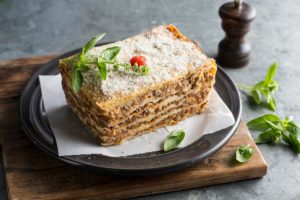

Biltong, Boerwors and Droewors.


Gary and Alec made biltong with whatever they could get their hands on, usually fresh springbok or buffalo from friend’s farms. The meat was sliced, salted, seasoned and cured to be hung in their laundry room to dry.
Alec’s recipe is still used at Field To Fork, however now, instead of springbok or buffalo, we use grass-fed Australian Angus beef. In case you were worried, we don’t make our biltong in a suburban laundry. Both shops have purpose-built dehydrating chambers installed with UV lights to destroy any wayward bacteria. Our biltong is a best-seller at both shops. If there was a Biltong Competition in Sydney, we’d be the first to enter. We think ours stands up to the best you can get, South Africa included.
Another of our South African favourites is our house-made boerwors. Boerwors is a traditional South African sausage and an important part of their national cuisine. The name derives from the Afrikaans/Dutch words for ‘farmer’ (boer) and ‘sausage’ (wors). Quite literally, it is a farmer’s sausage. Made with whatever meats they could source, it usually contained beef as well as lamb, pork and game, in any combination. We only °use Angus beef chuck steak in our ‘boerie’. We find the sausage benefits from a lower fat content than most sausages. We use a simple, old-fashioned spice recipe; black pepper, coriander seeds, nutmeg, cloves and salt. Boerwors is delicious, try ours grilled on the barbie and served with crustry bread rolls and chunky tomato chutney (or monkeygland sauce if you’re feeling lekker!).
We also make a range of droewors, like biltong, but in sausage form. The name is also quite literal; ‘droe’ meaning dry and ‘wors’ meaning sausage. It is all beef, low in fat and ready to snap and snack. Try Jason’s peri-peri droewors. We routinely get told it’s the best spicy droeie you can get.
The Butcher’s Grill
